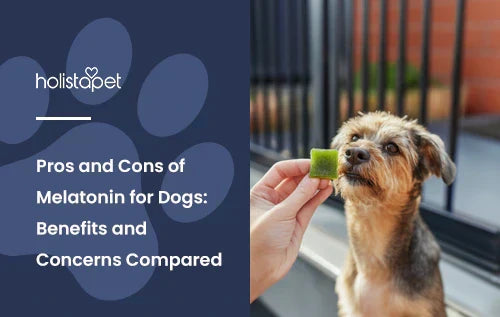Melatonin can help some pups snooze better, feel calmer, and handle certain challenges, but it's not a one-size-fits-all fix. Knowing the pros and cons of melatonin for dogs helps you make choices that truly fit your furry friend.
This natural hormone works in both humans and pets, but your canine companion's needs and health matter most. Let's dig into what makes melatonin a possible helper and where caution comes in.
What Is Melatonin and How Does It Work in Dogs?

Melatonin is a hormone produced in your dog's pineal gland, a small part of the brain that helps manage the sleep-wake cycle. It tells the body when it's time to rest, which is why some jittery pups benefit from melatonin supplements.
When given in the right amount, the hormone connects with melatonin receptors mainly located in the brain to promote relaxation and support restful sleep. Dog owners often use supplemental melatonin for sleep disorders or to calm anxious behaviors.
The Role of Melatonin in the Body
Melatonin works like a gentle timekeeper for your dog's body. It helps control the circadian rhythm. That's the internal clock that tells them when to be active and when to wind down. For many dogs, balanced melatonin levels support better sleep patterns and promote relaxation.
Melatonin also plays a role in regulating mood and keeping certain body processes on schedule. Research suggests it may even have antioxidant properties, helping protect cells from everyday wear and tear.
Natural vs. Synthetic Sources
Natural melatonin usually comes from animals or plants. Meanwhile, synthetic versions are specifically created to mimic the hormone your dog's body already produces. Both can work, but pet-specific products are specially formulated with safe ingredients for canine pets.
Using the right source matters because human melatonin supplements may contain additives that aren't dog-friendly. Always choose products designed for pets to keep your pup's routine safe and effective.
Is Melatonin Use Safe for Dogs?
Melatonin is generally considered safe for many dogs when given in the correct dosage. Owners often use it for sleep problems, anxious behaviors, or seasonal issues like hair loss. However, safety depends on your pet's overall health, current medications, and specific needs.
The best way to know if melatonin is right for your pup is to check with a veterinarian. They can recommend the best melatonin supplements tailored to your dog's weight, condition, and lifestyle.
When Vets Recommend Melatonin
Vets may prescribe melatonin for dogs who struggle with sleep disturbances, anxious behaviors, or certain skin and hair cycle issues. It can also support pups dealing with noise phobias, seasonal flank alopecia, or mild cognitive dysfunction.
In veterinary medicine, melatonin is sometimes paired with other medications or wellness products to promote relaxation and balance cortisol levels. The important thing is to confirm proper dosage and timing, so your pooch gets the benefits without unnecessary side effects.
When To Avoid or Use With Caution
Some dogs shouldn't take melatonin, especially those with conditions like diabetes, Cushing's disease, or hormone-related issues. It may also interfere with certain medications, so checking with your vet first is a must.
Dog owners should also avoid giving human melatonin supplements that contain xylitol or other harmful additives. For senior dogs or pups with chronic health concerns, careful monitoring helps melatonin stay a safe and effective part of their routine.
Pros of Melatonin for Dogs
Melatonin can offer several benefits when used appropriately for your pup. It's a natural remedy that supports relaxation and helps manage certain conditions, and it can fit easily into a dog's wellness plan. Pet owners often choose it for its gentle approach and variety of uses. Pros include:
- Helps Promote Relaxation and Calmness
- Supports Restful Sleep Patterns
- Can Aid Seasonal Shedding and Skin Health
- Generally Well-Tolerated With Few Side Effects
- Non-Habit Forming Sleep Support
- Available in Multiple Pet-Friendly Forms
Helps Promote Relaxation and Calmness
Melatonin connects with receptors in your dog's brain that influence mood and relaxation. This can help anxious pups settle down during stressful events like fireworks, storms, or travel. Many pet parents use it as part of a routine to encourage a calm environment at home.
Melatonin's gentle effect makes it a popular option for pets who need help winding down without strong sedatives. The goal is to promote relaxation while keeping your buddy alert and comfortable.
Supports Restful Sleep Patterns
Melatonin helps regulate the sleep-wake cycle, which makes it easy for pets to fall asleep and stay asleep through the night. This sleep aid can be especially helpful for older dogs or pups with disrupted schedules.
By signaling to the body it's time to rest, melatonin can help reduce nighttime restlessness. Owners often notice their dogs wake up more refreshed and ready for the day when their sleep patterns stay consistent and undisturbed.
May Aid Seasonal Shedding and Skin Health
Some dogs experience seasonal flank alopecia. That's a condition where hair loss appears in specific spots during certain times of the year. Melatonin can help support a healthy hair cycle and improve coat appearance over time.
Melatonin's role in regulating hormone production may also benefit overall skin condition. Owners sometimes see reduced shedding and better coat texture when melatonin supplementation matches their furry friend's seasonal needs.
Generally Well-Tolerated With Few Side Effects
Most dogs handle melatonin well when given in the correct dosage. Side effects, if they happen, are usually mild and short-lived. Pet parents often prefer it because it's less likely to cause major discomfort compared to stronger options.
When monitored by a vet, melatonin can be a safe addition to a dog's wellness routine. What you need to remember is to use only pet-specific products and follow proper guidelines for your pup's size and health needs.
Non-Habit Forming Sleep Support
Melatonin doesn't cause dependency, so your dog's internal hormone production stays balanced. This makes it a good option for pups who need occasional help with sleep or relaxation without long-term reliance.
Dog owners appreciate that they can use melatonin products for short periods or as part of a seasonal routine. Once it's no longer needed, most pets return to their normal sleep patterns without withdrawal or adjustment issues.
Available in Multiple Pet-Friendly Forms
Melatonin for dogs comes in chews, tablets, capsules, and liquid drops. This variety makes it easier to match your pup's preferences and needs. Flavored chews are often a favorite since they feel more like a treat than a supplement.
Pet-specific products are specially designed with pet-safe ingredients and dosages in mind. Choosing the right form with the right dose helps make giving melatonin a smoother, stress-free experience for both you and your best friend.
Cons of Melatonin for Dogs
While melatonin can be helpful, it's not without its drawbacks. Some dogs may react differently, and certain health conditions can make its use a little risky. Understanding the downsides helps owners make informed decisions before adding it to their dog's routine. Cons include:
- Possible Side Effects and Mild Reactions
- Risk of Overuse or Improper Dosage
- Not Suitable for All Health Conditions or Medications
- Effectiveness May Vary Between Dogs
- Potential Interaction With Hormone-Related Conditions
Possible Side Effects and Mild Reactions
Some dogs may experience slight discomfort after melatonin intake, such as sleepiness at unusual times or mild stomach troubles. These effects are typically short-lived and fade as the body adjusts.
Choosing pet-specific products and the correct dosage helps reduce the chance of unwanted reactions. If your pup shows changes in behavior or energy, it's best to check in with your vet before continuing melatonin supplementation.
Risk of Overuse or Improper Dosage
Giving too much melatonin can lead to unwanted effects like excessive drowsiness, digestive upset, or changes in mood. Overuse may also interfere with your pet's natural hormone production over time.
Following dosage guidelines based on your dog's weight is the safest approach. A vet can confirm the correct amount and frequency, so melatonin stays helpful without causing new issues.
Not Suitable for All Health Conditions or Medications
Melatonin may not be a good fit for canines with certain medical concerns, especially hormone-related issues or chronic illnesses. It can also interact with other medications, changing how they work in the body.
Fur parents should always discuss their dog's health history and current treatments with a vet before starting melatonin. This helps keep everything safe and effective for their specific situation.
Effectiveness May Vary Between Dogs
Not every pooch responds to melatonin in the same way. Some may show noticeable improvement in sleep or anxious behaviors, while others may see little change.
Differences in age, health, and underlying issues can influence results. Tracking your dog's response over time helps determine if melatonin is a good long-term fit or if another approach might work better.
Potential Interaction With Hormone-Related Conditions
Dogs with Cushing's disease, diabetes, or other hormone-related conditions may need to avoid melatonin. If needed, they may be able to use it under close supervision by a vet. This hormone can influence cortisol levels and affect how the body manages certain processes.
A vet can check whether melatonin fits safely into your dog's care plan. In some cases, adjustments to dosage or timing can help reduce the risk of complications.
Recommended Dosage Guidelines for Dogs
Melatonin dosage depends on your dog's weight, age, and health. Smaller pups typically need lower amounts, while larger breeds may require more for the same effect. Giving the correct dosage helps avoid unwanted side effects and keeps results consistent.
For detailed recommendations by size, check HolistaPet's melatonin dosage guide for dogs. Following these guidelines can help your pup get the right support for relaxation and better sleep, even seasonal coat care.
Short-Term vs. Long-Term Use
Your pup can use melatonin for short periods to address temporary issues like travel stress or noise phobias. In these cases, it's often given for just a few days or weeks.
Some canines may benefit from longer-term use for ongoing sleep disturbances or seasonal coat changes. A vet can help figure out how long melatonin should stay in your dog's routine to keep everything safe and effective.
Can Puppies Take Melatonin?
Puppies can sometimes ingest melatonin, but only under a vet's guidance. Their developing bodies may respond differently, so their dosage needs careful adjustment based on age and weight.
A vet can decide if melatonin is appropriate for a puppy's specific needs, such as short-term calming or sleep support. Using the right amount and form helps guarantee safety while avoiding unnecessary side effects.
How To Give Melatonin to Your Dog
Melatonin is available in several forms, making it easy to fit into your dog's routine. Chews are a popular pick since they taste like treats. Tablets and liquids, on the other hand, can work well for dogs who take pills easily.
Remember, choose pet-specific products to avoid harmful additives found in some human-specific supplements. Matching the form to your buddy's preferences helps make melatonin a fuss-free addition to their care.
Chews, Tablets, and Liquid Options
Owners can choose from flavored chews, traditional tablets, or liquid drops when giving melatonin. Chews often feel like a treat, making them the easiest option for picky eaters.
Tablets can work well for pets used to taking pills, while liquids allow for precise dosing. Picking the right format depends on your dog's size, taste preferences, and how comfortable they are with different delivery methods.
Tips for Easy Administration
Making melatonin part of your dog's routine can be simple with the right approach. Using tasty, pet-safe products helps, but a few tricks can make it even smoother. Try out the following:
- Hide in a Favorite Treat. Slip the chew or pill into a soft snack your dog already loves.
- Pair With Mealtime. Give melatonin alongside food to make it feel natural.
- Use Positive Reinforcement. Offer praise or a quick play session after dosing.
HolistaPet Melatonin Chews for Dogs

These soft chews combine melatonin with calming herbs like chamomile, passion flower, and valerian root. The formula is gentle, all-natural, and flavored to appeal to even picky pups.
Pet parents choose HolistaPet for our focus on safe, high-quality ingredients. Each chew is specifically designed to promote relaxation, support better sleep, and help anxious dogs feel more at ease without harsh additives.
FAQs – Pros and Cons of Melatonin for Dogs
Pet owners often have specific questions before trying melatonin for their dogs. Understanding how it works, how quickly it takes effect, and any possible risks helps you decide if it's right for your pup. The following answers cover timing, dosage, side effects, and product choices. Keep reading to learn more.
How quickly does melatonin work for dogs?
Melatonin usually starts working within 15 to 30 minutes after your dog takes it. The timing can vary depending on the form, dosage, and your pup's metabolism.
Owners often give melatonin before bedtime or ahead of stressful events like storms or fireworks. Planning the timing helps your dog feel the calming effects when they need it most.
Can I give my dog melatonin nightly?
Yes, some dogs can use melatonin every night if a vet approves it. Regular intake may help manage ongoing sleep disturbances or anxious behaviors.
The important thing is sticking to the correct dosage for your dog's size and monitoring for any changes. If you notice unusual reactions, check in with your vet to adjust the plan as needed.
Will melatonin make dogs too drowsy?
Melatonin can cause extra sleepiness in some dogs, especially if the dosage is too high. Most pups remain relaxed but alert when given the right amount.
If your pooch seems overly tired or sluggish during the day, a vet may suggest lowering the dosage. Adjusting the amount can help maintain benefits without unwanted drowsiness.
Can dogs be given human melatonin?
Some human melatonin products are safe for dogs, but many contain additives that can be harmful. Always check the label before giving any human supplement to your pup.
The safest choice is a pet-specific melatonin product. These are intentionally made with dog-friendly ingredients and dosages in mind. And so, they reduce the risk of unwanted side effects or reactions.
Can melatonin interact with other supplements or medications?
Yes, melatonin can interact with certain medications. This is especially true for those affecting hormone levels or the immune system. It may also influence how some supplements work in the body.
To keep your dog safe, share a full list of their medications and wellness products with your vet. Doing so helps avoid unwanted interactions and ensures the best results.
Final Thoughts – Melatonin for Dogs Pros and Cons
Melatonin can be a gentle way to help dogs relax, sleep better, or manage certain seasonal issues. Knowing both the benefits and possible drawbacks helps you decide if it fits your pup's needs.
Don't forget: HolistaPet's Melatonin Soft Chews give pet parents a safe, natural option made with calming herbs and flavors dogs enjoy. With the right guidance from your vet and a solid formula like ours, melatonin can be a helpful part of your best friend's wellness journey.


 Broad Spectrum CBD Oil for Dogs - Fast Acting
Broad Spectrum CBD Oil for Dogs - Fast Acting
 Chicken Flavored CBD Oil For Dogs - Easy Dose
Chicken Flavored CBD Oil For Dogs - Easy Dose
 Salmon Flavored CBD Oil For Dogs - Highly Rated
Salmon Flavored CBD Oil For Dogs - Highly Rated
 CBD Dog Treats for Anxiety - Loved by Thousands
CBD Dog Treats for Anxiety - Loved by Thousands





Leave a comment
All comments are moderated before being published.
This site is protected by hCaptcha and the hCaptcha Privacy Policy and Terms of Service apply.